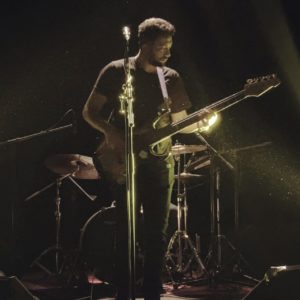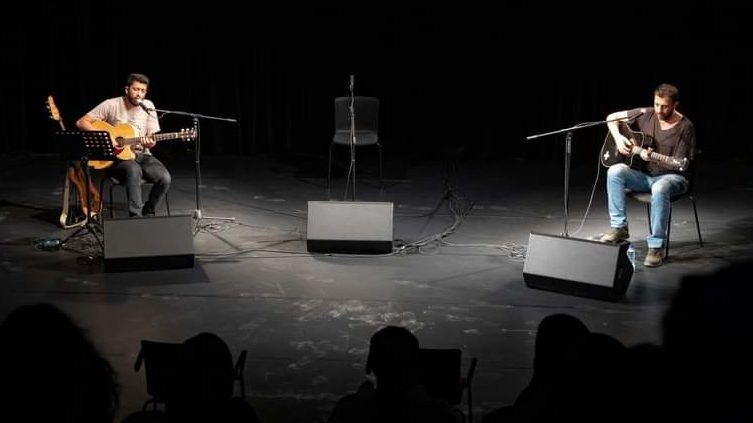Palestinian Blues, Other New Sounds Emerge from West Bank
Performers of alternative music blend traditional notes, foreign tunes
Guitarist and songwriter Shadi Zaqtan has mixed musical influences from the US Deep South with Arabic sounds, giving rise to a new genre of West Bank music, the Palestinian blues.
“Blues is very powerful; it speaks from the heart and I want to speak with my heart. This is what my music is about,” Zaqtan told The Media Line.
Blues is very powerful; it speaks from the heart and I want to speak with my heart. This is what my music is about
The simple blues rhythm allows him to insert Arabic tones or lyrics, he explains. His songs are about his observations of life and the Palestinian socio-economic situation, a “huge burden for one ordinary being.”
The 42-year-old is among a handful of musicians who struck out on their own in the West Bank city of Ramallah more than a decade ago.
Zaqtan studied briefly at the city’s conservatory. He says the music there was not for him, as he was more inspired by blues and rock.
Alternative bands have become more popular in the past few years, and it is only recently that individual singers performing his type of music have become better known.
In Zaqtan’s first album, Fi Balad – There is a Country, he released nine songs that were widely considered political. When he launched his latest album, Circus, at the A.M. Qattan Foundation in Ramallah, he sang four of his early songs and then his new tunes in an attempt to show that the decade-old political struggle had become a social struggle.

Shadi Zaqtan launches his newest album in August at the A.M. Qattan foundation in Ramallah. (Courtesy)
“Social irony” is the way he describes his new songs.
“This might be the most dangerous transformation, and I can only speak about it with my music,” Zaqtan said.
This might be the most dangerous transformation, and I can only speak about it with my music
“The thing is that all the political issues have become social questions, and we still do not accept them, yet we are forced to find ways to live with them,” he added. “At first it was dramatic, but it has found a way to become somewhat humorous.
Zaqtan lived in multiple Arab countries when he was a child and says he feels attached to indigenous groups and minorities, as well as their music. His arms are tattooed with symbols of indigenous groups around the world.
The musician said he hopes to inspire people and change lives, just like American blues singers did.
“What drew me the most to blues music is that it came from ordinary people, not necessarily artists, speaking out about their own struggles,” he explained. “It’s the type of music that expressed pain on farms and aboard ships.”
What drew me the most to blues music is that it came from ordinary people, not necessarily artists, speaking out about their own struggles
Zaqtan has meanwhile moved to Berlin, where he says he is exploring the street music but is “too shy to sing.”
His student, Jiries Babish, 26, says the similarities between blues and Arabic music include stories of injustice as well as familiar tones.
“When I was exposed to new music a year after I entered the music conservatory, I left it,” Babish told The Media Line.

Jiries Babish performs during the latest concert by Mafar in October at the A.M. Qattan foundation in Ramallah. (Courtesy)
He turned to alternative music and eventually to rock and blues blended with Arabic rhythms and lyrics.
He founded a band called Mafar in 2014, explaining that it “grew out of the local scene by singing about social issues faced by Arabs in different countries, especially after the revolutions broke out in many of them in the last decade.”
Mafar’s music addresses the social problems of Arab men, women and youth, and has collaborated with Zaqtan for the past three years.
Mafar’s lead singer is working on a song in an Algerian dialect, hoping to reach out to more people who are attracted by the music’s beat.
“My top hit was a song with the lyrics of the Bedouin, who are all over the Levant, and set to waltz music,” Babish said.
This shows, he says, that “we are all connected” with music.
“We feel 100% connected, regardless of language differences. We enjoy the familiarity of the beat,” he said, noting that the rhythm of the blues is very similar to North African and other African music.

Zaqtan (left) and Babish (right) play at a bar in Ramallah this past summer. (Courtesy)
Mohammad Dasuqi, a 30-year-old producer in Ramallah’s film and music industries, says that what is new is the way Palestinian musicians blend different genres with their Arabic style, whether through the subjects they sing about, the use of Levantine instruments, the rhythms or just the singing style.
“They have been inspired by Western music, but they are not carried away by it,” Dasuqi told The Media Line. “This can be the seed of a new music movement in Palestine.”
They have been inspired by Western music, but they are not carried away by it

